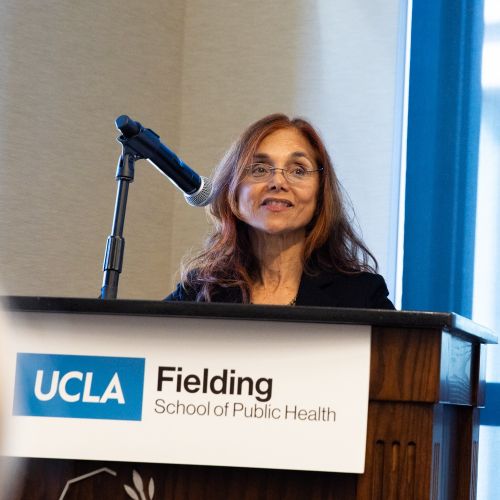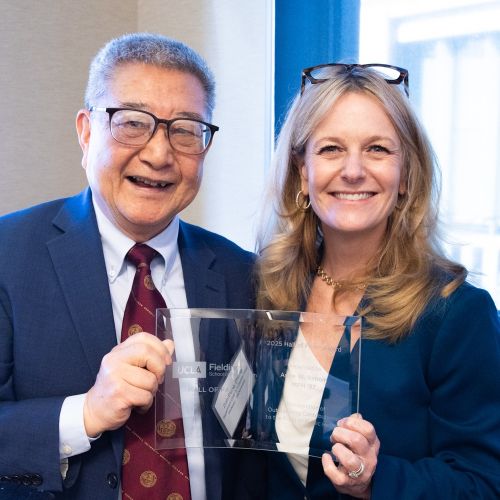How UCLA Fielding is working to improve the health of veterans
Research partnership demonstrates school’s position as a center of excellence in veterans' health.

The UCLA Fielding School of Public Health, through a decades-long relationship with the Veterans Affairs (VA) Healthcare System in Los Angeles, has a long history of successful collaboration with VA researchers and healthcare providers dating to the school’s creation in 1961.
“The combination of academic research by UCLA and VA faculty, many of whom also deliver care to veterans at the VA, is really a case where the whole is greater than the sum of its parts,” said Dr. Elizabeth Yano, professor in the Fielding School’s Department of Health Policy and Management and of medicine at the David Geffen School of Medicine at UCLA, and director of the VA‘s Center for the Study of Healthcare Innovation, Implementation & Policy at the VA Greater Los Angeles Healthcare System. “This work changes practice, based on what is observed as gaps in care, and talking with veterans about what they need and experience so the next studies can act on them; and on top of that, veterans continue to serve by participating in research that makes a difference in their health, and that of all Americans.”
Yano, an epidemiologist who has worked at the VA for more than three decades, is a specialist in the development and testing of evidence-based quality improvement (EBQI) approaches for implementing, tailoring and spreading care models to improve system and practice-level quality and outcomes, with a focus on primary care and women’s health.
“When I started as a VA researcher, women veterans were about 2% of the users of the VA health care system, but now there are 800,000 women veterans who use the VA for their care – more than 11% of the overall patient population - and make up about 45% of all new VA patients,” said Yano, who is affiliated with the VA Greater Los Angeles Healthcare System (VAGLAHS), which serves veterans from Los Angeles north to Bakersfield and San Luis Obispo. “They're the fastest growing segment of new users of VA care nationally.”
The veterans’ health-focused studies by UCLA researchers, many with affiliations with VAGLAHS and/or the UCLA schools of public health, medicine, nursing, and dentistry, run from operational and organizational improvement to the prevention and treatment of chronic diseases. Recent work has included:
- A series of peer-reviewed research studies of colorectal cancer screening rates, and developing interventions to increase colorectal cancer prevention and early detection;
- Research into the use of artificial intelligence (AI) to improve risk assessment for those suffering from diabetes and related complications;
- Research into pancreatic cancer, including the molecular and cellular mechanisms underlying pancreatitis and pancreatic cancer.
- Research into the use of electronic health records (EHR) in primary care settings by nurses and improving the record systems to expedite and improve care.
“This research is a testament to the power of interdisciplinary collaboration," said Dr. Michael Ong, a physician and professor-in-residence of medicine and Health Policy and Management at UCLA Fielding and associate chief of staff for research and development at VAGLAHS. "By combining scientific and clinical expertise, we are building next-generation tools to transform complex disease management and personalized medicine.”
Along with research to improve VA healthcare delivery, Yano’s team at the Center for the Study of Healthcare Innovation, Implementation & Policy (CSHIIP) – co-led by Dr. David Ganz, a physician and UCLA Fielding alum - has worked on projects to modernize the VA’s electronic health records system. Two of the lead researchers on that project are Dr. Isomi Miake-Lye and Dr. Julian Brunner, both faculty members at, and alumni of, UCLA Fielding.
“The VA is in the middle of a huge technology change, replacing the computer system for patient records that it pioneered and has used for decades,” Brunner said. “These days, so much of what doctors and nurses do happens through the computer, and when you change the software, it really shakes things up.”
The effort was recognized by the VA in 2024 with its “Health Systems Impact Award,” which honors VA-funded research that has had a direct and important impact on clinical practice or clinical policy within VA healthcare - and that has been successfully translated into VA policy or operations.
“They’re going hospital by hospital, replacing the old system with the new one, and refining the implementation process each time,” Brunner said. “That’s where applied researchers like us do our best work: searching for the biggest challenges and bright spots each time and helping VA policymakers figure out ways to make it better.”
It is that sort of practice that attracted Yano to the UCLA-VA partnership originally - and keeps both she and her peers engaged.
“One of the reasons I love being a researcher in the VA is because what you find matters, and the VA acts on our research results,” Yano said. “That - just to be honest - doesn't happen elsewhere, to the same degree.”
Funding
The studies referenced above were supported, in part, by federal grants and resources from the U.S. Department of Veterans Affairs and the Veterans Health Administration, the Department of Health and Human Services, the National Cancer Institute, and the National Institutes of Health, as well as philanthropic and academic support. The content of the studies is solely the responsibility of the authors and does not represent the views of the Department of Veterans Affairs or the U.S. Government.

